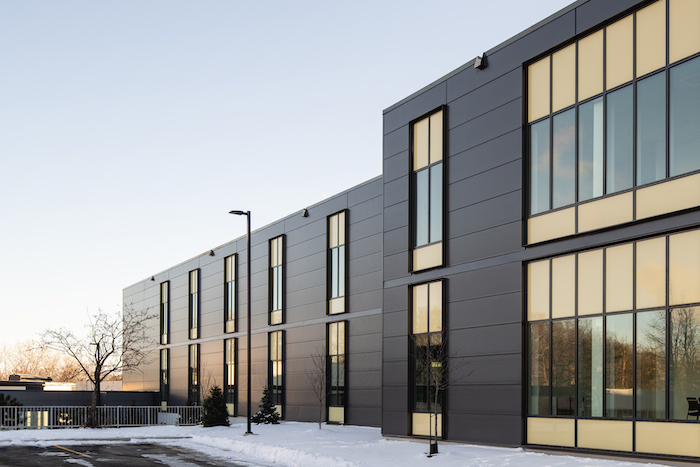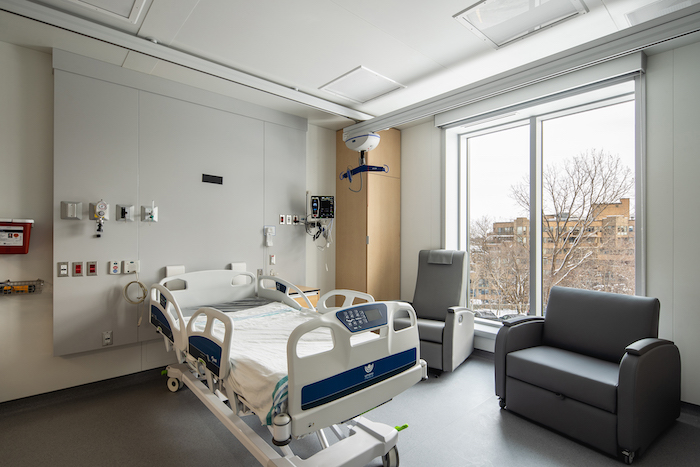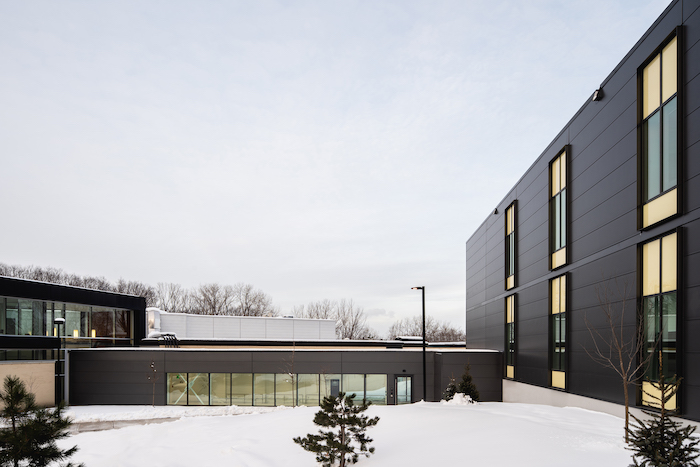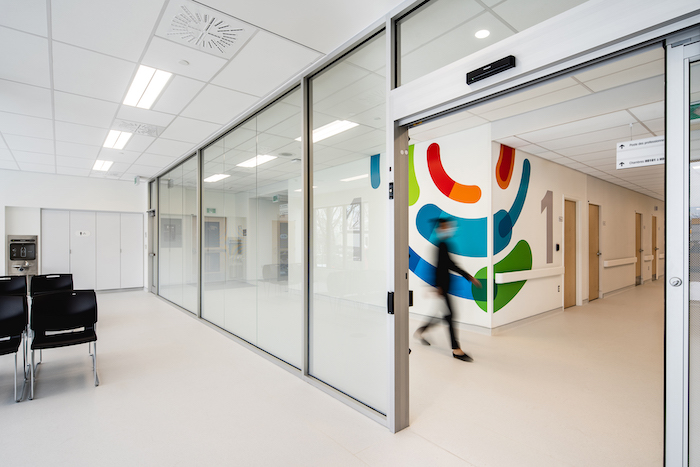
2021 #CCEawards Showcase: Hôpital Maisonneuve-Rosemont Modular Complex
November 11, 2021
By CCE
“It stands out as an example of excellent work under extraordinary circumstances and thinking about long-term uses, not just short-term benefits.”- Jury
Category: Buildings
Award of Excellence Winner: WSP Canada
When the COVID-19 pandemic was declared in early 2020, the government of Quebec declared a state of emergency and activated preventive measures. As part of this pandemic response, Montreal’s Hôpital Maisonneuve-Rosemont (HMR) requested a modular complex to be built rapidly, so it could accommodate the increased patient load from COVID-19, but could also be used post-pandemic to accommodate the needs of the hospital’s oncology program, serving cancer patients.
HMR engaged WSP Canada, alongside architectural partner Architecture49, to provide all mechanical, electrical, telecommunications, structural and civil engineering services for the project. WSP also provided environmental, geotechnical, surveying and laboratory studies and commissioned the project on time, in a fast-paced environment.
In the end, the two-storey, 3,200-m2 facility was designed and constructed in less than eight months. The hospital was able to adapt to a changing health-care crisis, while ensuring its investment would serve the community well into the future.
A non-traditional approach
To meet an aggressive timeline and increased demand for rooms due to the pandemic, the project was designed to accommodate a modular construction process. Energy-efficient mechanical and electrical systems were designed and specified to accommodate ‘plug and play’ modules that were shipped to the HMR site from an off-site construction facility. MECART, the modular constructor, was engaged throughout the design process to help streamline it.
The engineering systems were designed to accommodate HMR’s specific health-care needs, the modular construction techniques and a clinical change of use following the pandemic. So, they were not typical of traditional health-care facility design.
For the patient rooms, for example, mechanical systems and controls designed to provide negative pressure during COVID-19 can be switched to positive pressure in the future for immune-compromised cancer patients, with minimal intervention. Detachable wall panels allow the facility’s wall-mounted electrical and communication services to be easily reconfigured with changes in patient care.
High-efficiency particulate air (HEPA) filters were installed in the ventilation systems. Full redundancy for heating, ventilation and air conditioning (HVAC) and electrical power was provided by an emergency backup generator and distribution system for power interruption events. Corrosion-resistant flooring was specified for ease of maintenance.
The project has helped improve the quality of life for local communities. While it was implemented to meet an immediate need, it has been built to last for decades to come.
Social and environmental benefits
At the onset of the pandemic, interruptions to the traditional construction supply chain were identified as a major risk, as international borders began to close to traffic and trade. The project would therefore need to rely heavily on the services of local manufacturers, instead of sourcing from international suppliers.
In addition to working with MECART, a modular cleanroom manufacturer based in Saint-Augustin-de-Desmaures, Que., construction labour was also local, with Pomerleau assembling the building and constructing its base components to accept MECART’s modular pods. Most of the supply chain was kept within Quebec.
Sourcing locally reduced carbon emissions in comparison to international shipping, while building the rooms off-site in a quality-controlled facility reduced health and safety hazards and material waste in comparison to on-site construction, particularly by reducing construction time by almost 50% of the initial estimated schedule. An added benefit was a reduction of the disturbance of construction activities on the surrounding community.
Setting a precedent
Modular construction for the health-care sector has long been touted as a promising technology to shorten project completion time, while maintaining or increasing quality control. Despite this, adoption of the methodology has been slow so far.
The successful design and construction of the two-storey HMR modular complex has helped set a precedent for rapid construction to support future crisis-management strategies. The project is now a model for other hospitals. And once the COVID-19 crisis has passed, its 36 patient rooms will be repurposed to fit the needs of the hospital for at least another decade.
Hôpital Maisonneuve-Rosemont Modular Complex, Montreal, Que.
Award-winning firm (prime consultant, quantity surveying, land surveying, urban planning, lab services, commissioning, architecture, building science and geotechnical, civil, structural, mechanical, electrical and telecommunication engineering): WSP Canada, Montreal (Louis Boissonneault, ing.; Benoit Lemire, ing.; Pierre Rodrigue, ing.; Joël Boudreau, Tech.; François Patry, ing.; Martin Villemure, ing.; Stéphane Éthier, ing.; Mario Bouchard, ing.; Catherine Jolin-Duhamel, ing.; Juan Gamarra, Arch.).
Owner: Centre intégré universitaire de santé et de services sociaux de l’Est-de-l’Île-de-Montréal (CIUSSS-EMTL).
Other key players: Société Québécoise des infrastructures (SQI) (client), Architecture49 (architect), MECART (modular rooms), Pomerleau (construction manager), Consultants Expertise en Ascenseurs (CEA) (elevators).



